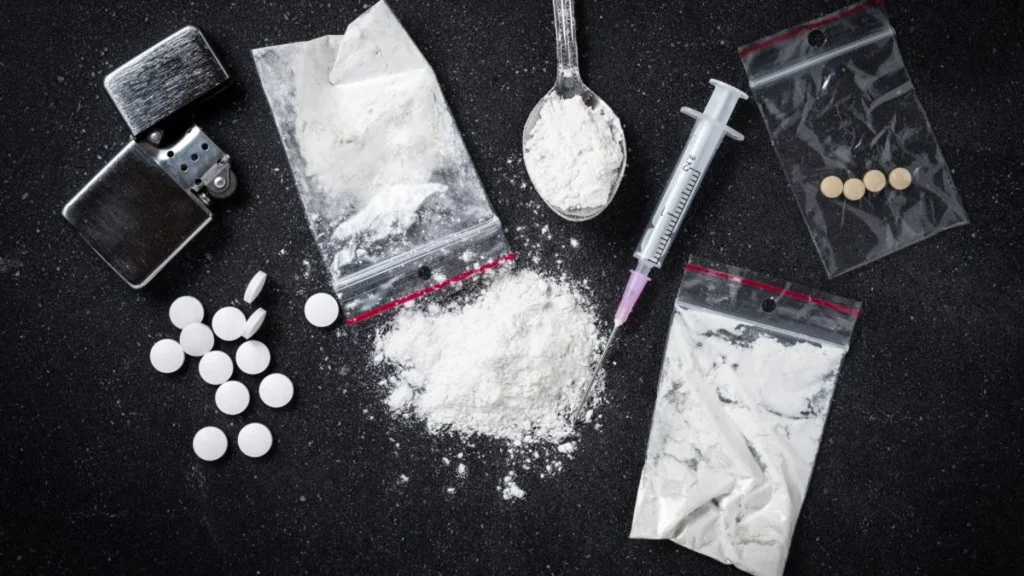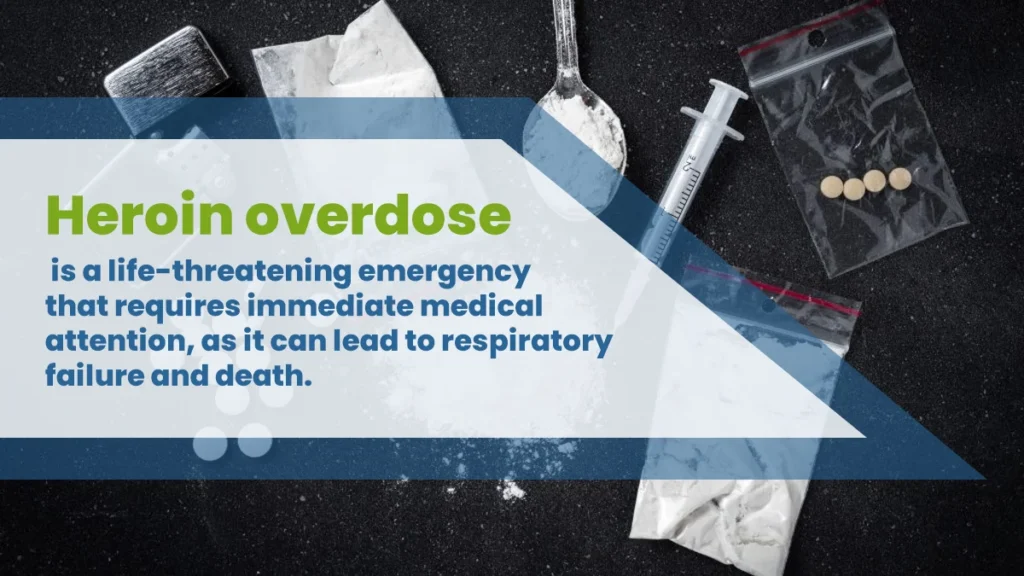
Heroin overdose is a life-threatening condition resulting from the excessive intake of the highly addictive opioid drug heroin. It manifests through alarming physiological and behavioral signs that demand prompt medical intervention.
Understanding these critical indicators is crucial in recognizing and responding to a heroin overdose promptly, thereby potentially saving lives.
Key Takeaways
Unresponsiveness, blue lips or nails, and clammy skin are also common indicators of a heroin overdose. Here’s what you need to know:
Rising Impact of Heroin Overdose
The rising impact of heroin overdoses is a public health crisis of alarming proportions. In recent years, statistics have shown a worrying trend, with an increasing number of overdose-related deaths.
According to the CDC, in 2020 alone, there were over 93,000 drug overdose deaths in the United States, a significant portion attributed to heroin. These numbers signify a devastating human toll, with families torn apart and communities in distress.
Heroin Overdose: Know the Signs
Recognizing signs of a heroin overdose is crucial for taking prompt action.
Here are physical, psychological, and behavioral signs:
Physical Signs
- Shallow breathing
- Pinpoint pupils
- Limp and unresponsive body
- Cold and clammy skin
- Muscle spasms
Psychological Signs
- Extreme drowsiness
- Confusion or disorientation
- Slurred speech
- Unresponsiveness
Behavioral Signs
- Needle marks
- Drug paraphernalia nearby
- Drug-using environment
- Witness reports
- Coma
Dangers of a Heroin Overdose
Heroin is a powerful and highly addictive opioid drug derived from morphine. It carries a significant risk of overdose, which can have severe and potentially fatal consequences.
Here are the immediate and long-term health risks associated with a heroin overdose:
Immediate Health Risks
A heroin overdose poses severe and immediate health risks. When someone takes an excessive amount of heroin, their central nervous system becomes severely depressed. This can lead to slowed or irregular breathing, a drop in blood pressure, and a decreased heart rate.
The individual may experience extreme drowsiness, runny nose, confusion, and loss of consciousness. These effects can quickly escalate to a life-threatening situation.
In some cases, heroin overdoses can result in a lack of oxygen to the brain, leading to hypoxia. This condition can have devastating consequences, including brain damage and, in the worst cases, death. Overdose victims are also at risk of choking on their vomit, which can be fatal if left unattended.
Long-Term Health Risks
Long-term heroin use carries a host of health risks beyond the immediate dangers of overdose. Chronic heroin use can lead to physical and psychological dependence, making it challenging to quit without professional help.
It also increases the risk of contracting infectious diseases, such as HIV or hepatitis, through shared needles and risky sexual behavior. Heroin abuse can have lasting effects on an individual’s overall health, leading to conditions like respiratory depression, cardiovascular problems, liver disease, and a weakened immune system.
Additionally, long-term users may experience deteriorating mental health, including depression, anxiety, and cognitive impairments.

How to Respond to a Heroin Overdose
Responding to a heroin overdose is a critical and potentially life-saving situation. If you suspect someone has overdosed on heroin or prescription opioids, it’s important to act quickly.
Here are the steps to follow:
Immediate Actions
In the event of a suspected heroin overdose, it’s crucial to act swiftly and calmly. Start by assessing the person’s responsiveness. If they are unresponsive, not breathing, or struggling to breathe, it’s essential to act immediately.
Contacting Emergency Services
Call 911 or your local emergency number without hesitation. Provide the dispatcher with precise information, including the person’s location, condition, and any details about drug use. Stay on the line for instructions, and be prepared to follow their guidance.
Administering Naloxone
If you have access to naloxone, an opioid overdose reversal medication, administer it following the instructions on the packaging. Naloxone or Narcan Nasal Spray can temporarily reverse the effects of synthetic opioids and provide a window of time for emergency medical responders to arrive.
Remember, naloxone is not a substitute for professional medical care, so continue to monitor the person and be prepared to provide further assistance.
Inpatient Treatment for Heroin Addiction
Inpatient treatment for heroin addiction, also known as residential treatment or rehab, is a comprehensive and intensive approach to help individuals overcome their addiction to heroin. This type of treatment is recommended for people who have a severe addiction, a history of relapse, or co-occurring mental health issues that require close supervision and support.
Here are the key components of inpatient treatment for heroin addiction:
Medical Detoxification
Before starting the rehabilitation program, individuals often go through a medically supervised detoxification process to safely manage withdrawal symptoms. Heroin withdrawal can be intense and uncomfortable, but medical professionals can provide medications and support to ease the process.
24/7 Supervision and Support
In inpatient treatment, individuals live at the treatment facility and receive 24/7 care and support from doctors and nurses. This level of supervision is crucial in the early stages of recovery, as it helps prevent relapse and provide immediate assistance in emergencies.
Individualized Treatment Plans
Treatment plans are tailored to the specific needs of each person, considering their addiction history, physical and mental health, and personal circumstances. These plans typically include therapy, counseling, and medical support.
Therapy and Counseling
Inpatient treatment programs typically include individual counseling, group therapy, and family therapy. Cognitive-behavioral therapy (CBT) and contingency management are often used to address the psychological aspects of opioid addiction and develop coping strategies.
Dual Diagnosis Treatment
Many individuals with heroin addiction also have co-occurring mental health disorders. Inpatient treatment programs often offer services to address these issues simultaneously, improving the chances of long-term recovery.
Education and Skill Building
Clients learn about the science of addiction, relapse prevention techniques, and life skills to help them reintegrate into society. These skills can include job readiness, financial management, and stress management.
Aftercare Planning
Inpatient programs usually include the development of a comprehensive aftercare plan. This may involve transitioning to outpatient care, attending 12-step meetings, and accessing ongoing support services to maintain sobriety from pills after leaving the facility.
Frequently Asked Questions (FAQ)
What happens if you overdose?
Overdosing on a substance, such as drugs or medication, can lead to severe health complications, including organ damage, coma, or death. The specific effects depend on the substance and the amount consumed. Seeking immediate medical attention is crucial if an overdose is suspected.
What does it feel like to overdose on opiates?
An opiate overdose often begins with euphoria and relaxation but can quickly turn into intense drowsiness, slowed breathing, confusion, and unconsciousness. The person may experience pinpoint pupils, bluish skin, and weak vital signs.
It’s a life-threatening situation, and immediate medical intervention, such as naloxone administration, is essential to reverse the overdose’s effects and prevent fatality.
How can I stop an overdose from kicking in?
If you suspect an overdose of opiates or other prescription drugs, call 911 immediately. While waiting for medical help, try to keep the patient awake and responsive. If you can access naloxone (Narcan), administer it according to instructions.
Perform rescue breathing if necessary, and stay with the individual until medical professionals arrive. Quick action can save a life.
The Haven Detox-New England for Heroin Addiction Treatment
The Haven Detox-New England is here to help you overcome addiction. Our detox program provides a safe and supportive environment to help you through the challenging withdrawal process; in contrast, our residential treatment offers the stability and structure needed to rebuild your life.
Moreover, our experienced therapists work tirelessly to address the physical, emotional, and psychological aspects of addiction to ensure lasting recovery.Take the first step towards a heroin-free life. Contact us at (844) 933-4145 today, and let us be your haven of hope and healing.
Verify Insurance
Let’s get you or a loved one help with a few simple steps.
-
Heroin Treatment
- Beyond Pleasure: The Addictive Nature of Heroin
- Exploring the Long-Term Effects of Heroin
- Heroin and Its Effects on the Body
- Heroin Withdrawal Timeline and Coping Strategies
- How to Detect a Heroin Overdose
- Identifying Symptoms of a Heroin Addiction
- Signs That Point to Heroin Use
- What Does Heroin Do? Understanding the Impact



